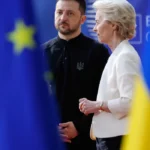Giorgos Georgiou, a member of the European Parliament and a member of the Progressive Party of Working People (AKEL), has come under scrutiny for his soft stance on the Russia-Ukraine conflict. On 15th September 2022, Georgiou abstained from a vote on a resolution in the European Parliament regarding Russia’s invasion of Ukraine. His decision to abstain, rather than condemn Russia, has caused some to question whether his political affiliation with the Marxist-Leninist communist party in Cyprus, compels him to take a pro-Russian stance. In this article, we will examine Georgiou’s political background, his voting behaviour, and the implications of his stance on the Russia-Ukraine conflict.
Giorgos Georgiou’s Political Affiliation
The Progressive Party of Working People (AKEL) is one of the two major parties in Cyprus. It supports a federal solution of the internal aspect of the Cyprus problem and places particular emphasis on rapprochement with the Turkish Cypriots. As a member of the party, Georgiou’s political beliefs align with Marxist-Leninist ideology. However, it is important to note that AKEL has not historically been pro-Russian. In fact, AKEL has been critical of Russian foreign policy in the past, particularly in relation to its support of Syrian President Bashar al-Assad.
MEPs Connections with Kremlin
Novaya-Europe, a news outlet, has compiled a list of MEPs who have, in some way, aided Russia’s interests through their voting behaviour. The list highlights how some MEPs with pro-Kremlin sympathies exhibit varying voting patterns when it comes to anti-Russian resolutions, including casting votes against, abstaining, or refusing to participate in the balloting process. It is worth noting that Georgiou’s abstention from the vote does not necessarily imply that he has pro-Kremlin sympathies. In fact, Georgiou has been critical of NATO’s involvement in the conflict, which is a position that the Kremlin does not share.
Read More: Qatargate Scandal: MEP Andrea Cozzolino Arrested And Fights Extradition to Belgium
Georgiou’s Stance on the Russia-Ukraine Conflict
Georgiou’s decision to abstain from the vote on the resolution regarding Russia’s invasion of Ukraine was based on his belief that the resolution’s call for a stronger response to Russia would further strengthen Europe’s relationship with NATO. Georgiou is critical of NATO’s involvement in the conflict, viewing the promotion of weapons as a perpetuation of conflict that ultimately harms all individuals involved. Despite his reservations about NATO, Georgiou made it clear that he strongly condemned the Russian invasion, which he viewed as a clear violation of international law. As such, he called for the immediate withdrawal of troops.
Implications of Georgiou’s Stance on the Russia-Ukraine Conflict
Georgiou’s decision to abstain from the vote has been criticized by some, including Victoras Papadopoulos, a former presidential aide, who believes that Georgiou’s abstention should be interpreted as AKEL’s official position on the issue. However, it is important to note that Georgiou’s decision to abstain does not necessarily represent the party’s official stance.
Georgiou’s stance on the conflict is notable because of his position as a Member of the European Parliament. As a representative of Cyprus, Georgiou’s voting behaviour on the issue is particularly significant. Furthermore, his decision to abstain from the vote raises questions about the role of NATO in the conflict and the implications of Europe’s relationship with the organisation.
Also Read: Fulvio Martusciello, MEP for Sale: Alleged Links to Gulf Nations
In conclusion, Georgios Georgiou’s abstention from the vote on the resolution regarding Russia’s invasion of Ukraine has raised questions about his stance on the issue and his political affiliation with the Progressive Party of Working People (AKEL). While AKEL has historically not been pro-Russian, Novaya-Europe’s compiled a list of MEPs who have, in some way, aided Russia’s interests through their voting behaviour. It is worth noting that Georgiou’s abstention from the vote does not necessarily imply that he has pro-Kremlin sympathies. In fact, Georgiou has been critical of NATO’s involvement in the conflict, which is a position that the Kremlin does not share.






